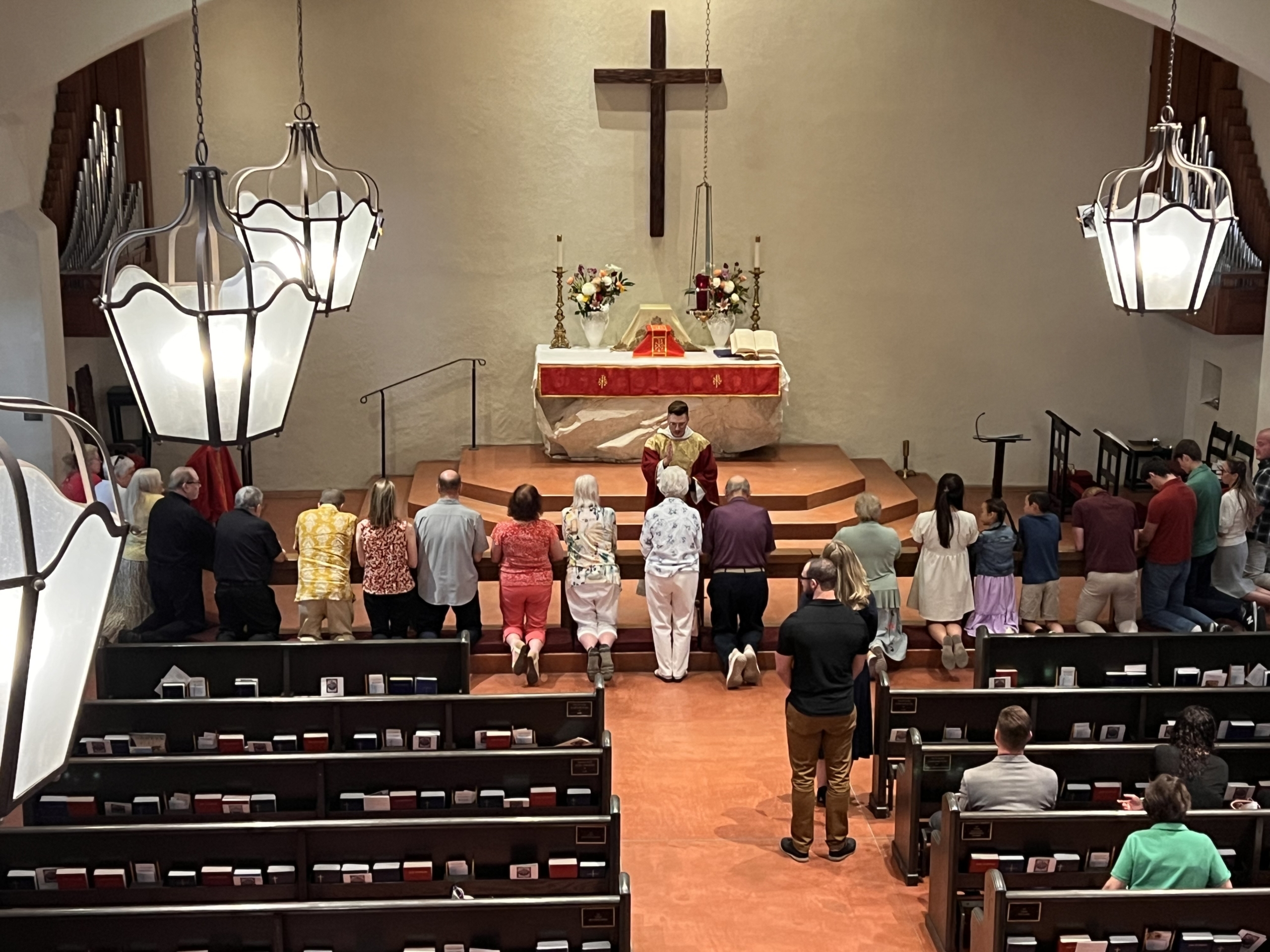(Photo: Father Ory Schultheis after ordination giving a blessing to the congregation)
by Father Andrew Harrah
Sermon for Deacon Schultheis’ Ordination
June 14, 2025
In just a few minutes, we will hear Bishop Hansen read the Exhortation from the Prayer Book to Deacon Schultheis concerning the dignity and importance of the priesthood. Deacon Schultheis will be exhorted to have in remembrance how weighty are the responsibilities of the priest’s office and charge. The exhortation draws upon three biblical images for this office, and I want to comment upon them this morning. A priest is called to be a messenger, a watchman, and a steward of the Lord. What does the Bible mean by these images?
The priest is called to be a messenger: “For the priest’s lips should keep knowledge, And they should seek the law at his mouth: For he is the messenger of the Lord of hosts” (Malachi 2:7). The priest is called the messenger of the Lord, which means he has the solemn responsibility of speaking on behalf of God. This is directly tied to his preaching and teaching ministry. His lips should “keep knowledge,” and the “people should seek the law from his mouth.” If the priest presumes to speak for God, that means he must know what God says—which means he should know the Word of God. The priest needs to know the Bible, first and foremost, so as to bring the Word of God to bear in the pulpit and in individual counseling with divine authority. If the warp and woof of the priest is not the Bible, then his message will not ultimately be a divine message. It might be a clever, or informative, or entertaining, or funny message, but it will not be a divine message.
The priest is called to be a watchman: “Son of man, I have made thee a watchman unto the house of Israel: therefore hear the word at my mouth, and give them warning from me” (Ezekiel 3:17). In ancient Israel, a watchman was a man who was set on the walls of a city to watch for enemies and warn the people of them. The priest as watchman has a ministry of warning. Sin is deadly. It wrecks lives and destroys souls. The priest must “warn the wicked from his way” in individual counseling and from the pulpit. If he neglects the ministry of warning, God will hold him accountable.
Priest’s have a temptation to be men-pleasers. We want people to like us. Warning people of the gravity and destructiveness of sin is not exactly the sort of conversation that makes one the life of the party. But it is essential to priestly ministry. This is why the priesthood is a vocation, and not just a job.
The priest is called to be a steward of the Lord: “Let a man so account of us, as of the ministers of Christ, and stewards of the mysteries of God” (1 Corinthians 4:1). A steward is a trusted servant who has received the authority from his master to administer the master’s goods on his behalf. Priests have received a sacred trust that they are duty bound to steward faithfully. The mysteries, broadly speaking, refers to the dogmas of the church, the deposit of faith revealed in the Word of God which the priest is to guard, at the heart of which is the Gospel (2 Tim. 1:13-14). That means that he passes on what he has received; he does not change the deposit according to his own whims or the spirit of the age.
The mysteries, more narrowly defined, refer to the sacraments of the church. The English word “sacrament” comes from the Latin sacramentum which is a translation of the Greek musterion, from which of course we get our English word “mystery.” The sacraments are holy and ought to be reverenced as such. Their liturgical observance should be dignified and conducted as excellently as possible. But the sacred trust of the pure preaching of God’s Word and the right administration of his sacraments is not an end in itself—it is so that God may be glorified through the feeding and nourishing of his people.
St. Paul continues: “Moreover it is required in stewards, that a man be found faithful” (1 Cor. 4:2). Notice that the requirement here is a matter of character, not of personal charisma. St. Paul does not say it is required that in stewards that one be found dynamic, or successful, or funny, or charming, or clever. No, the priestly ministry is fundamentally about fidelity to Christ, to his Word and to his sacraments.
How is the priest to be become a competent messenger, a courageous watchman, and a faithful steward? “Not that we are sufficient of ourselves to think any thing as of ourselves; but our sufficiency is of God; Who also hath made us able ministers of the new testament” (2 Cor. 3:5-6). The priest does not become a competent messenger, a courageous watchman, and a faithful steward by his own power, but by God’s power. Priests are not sufficient in themselves, and should therefore not think anything of themselves. It is God who has made us able ministers of the New Testament, and it will always be God who continues to make us able ministers of the New Testament.
Ory, in yourself, you are insufficient to the task of remaining faithful to the sacred trust that you are about to receive. I hope you feel insufficient. If you do not feel it now, pray for it, because it is a grace which forces you to lean into God. It guards against pride and presumption. But be encouraged: God will make you sufficient. He is about to give you, through the laying on Bishop Hansen’s hands, the grace of ordering to the priesthood.
Ory, I charge you in the presence of God, of Bishop Hansen, and of this congregation, to be a man who throws himself upon the sufficiency of God. Be a man of constant, regular, faithful prayer. By being regularly with God, you will have access to his divine life—his influence, his activity, his power, and most importantly, his love—the love that you will need to love his people. Pray the Daily Office. In addition to the Daily Office, bring to him every matter of your priestly ministry, of your marriage, and of your family life. Bring to him your own sins and weaknesses. Open up your heart to him. There should be nothing within you and your life that is off limits to God. Pray earnestly for his Holy Spirit, that you may exercise the office of your sacred ministry as a man after God’s own heart.






